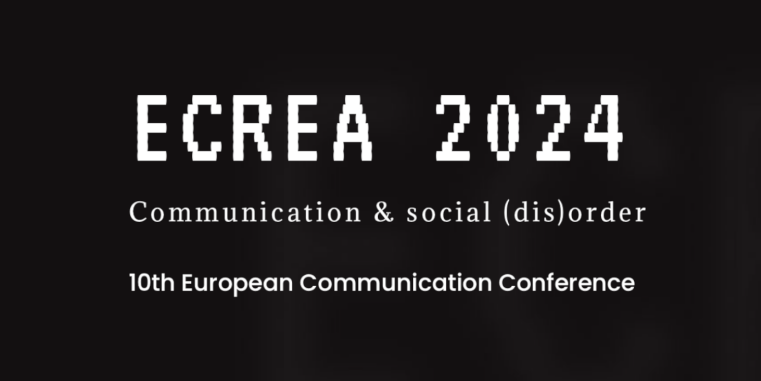

ECREA Conference 2024: IfK Researchers Participate with 25 Contributions
(19.09.2024) From September 24 to 27, the tenth European Communication Conference (ECC) of the European Communication Research and Education Association (ECREA) will take place. Under the theme "Communication & social (dis)order", researchers from European universities will discuss the (dys)functionality of current communication and its societal implications. Numerous scholars from the Departmant of Communication at the University of Münster will also be present at this year's conference in Slovenia.
This year, the ECC is hosted by the Faculty of Social Sciences at the University of Ljubljana in Slovenia. Over four days, the conference contributions will explore the importance of media and communication in today’s globalized society and how they influence social order. Changes in the fields of politics, economics, health, and technology have led to a redesign of current communication. Against the backdrop of ongoing conflicts, capitalist crises, extreme climate conditions, and artificial intelligences, the role of media in these scenarios will be analyzed and discussed. Both the destructive disruptions and creative potentials of communication will be reflected upon.
The Department of Communication is represented with a total of 25 contributions at this year's ECC conference of ECREA.
- „Against the mainstream but for what? – An automated content analysis of alternative worldviews towards climate change“
Svenja Boberg, Saïd Unger, Johanna Klapproth, Thorsten Quandt - „A laboratory experiment examining audience responses to touristic virtual reality videos“
Johanna Klausing, Regina Darenko, Max Knobloch, Jens Nötzold, Nadège Seibring, Jana Windoffer, Felix Reer - "A climate of change? Unveiling the impact of multimodal climate change coverage on public perception and policy support"
Katharina Maubach - „Alternative epistemic authorities – A mixed methods approach to referencing practices of users in alternative online publics“
Saïd Unger, Johanna Klapproth, Svenja Boberg, Thorsten Quandt - „A Practice Approach to AI Infrastructures and Sustainability“
Anne Mollen, Sigrid Kannengießer - „Between civil disobedience and democracy threat: Media portrayals of disruptive climate protest“
Lea von den Driesch - „Coping with precarity: Journalists’ strategies to find ease in a professionally vulnerable situation“
Nina Springer, Jana Rick - „Does contact with science communication increase trust in science? The mediating role of perceived trustworthiness“
Florian Wintterlin - "Discussion mechanisms and general circumstances of emotional news discussion – An analysis based on the Model of Collective Information Processing"
Désirée Hammer - „Expectations of reciprocal interaction: A Q-sort study with journalists and audience members“
Bernadette Uth, Helena Stehle, Hanne Detel, Nicole Podschuweit, Isabell Klawitter - „Exploring patchwork religions – An automated text analysis of new ideological movements“
Anna Davydova, Saïd Unger, Thorsten Quandt - "Experiencing music media change in mediatized everyday life: Comparing the early phases of the appropriation of the Walkman and music streaming services“
Jo Marie Dominiak - „Features of disinformation: An interview study on disinformation perceptions with political, governmental, journalistic and economic decision-makers in Germany“
Johanna Klapproth, Saïd Unger, Svenja Boberg, Thorsten Quandt - „From the influence of the social environment to perceived disinformation – An analysis of factors influencing intentional and unintentional news avoidance among young adults“
Paula Weitz, Marie Rosauer, Julia Metag - „Generative AI as the double-edged sword of journalism: A political economy perspective on journalism and AI infrastructures“
Anne Mollen - „Global Warming's Five Germanys: Unveiling media habits and information seeking in daily life“
Julia Metag, Marina Scholthaus, Kira Klinger - „Hijacking information flows through initiating topic drifts: Analyzing temporal patterns of how counter-public actors shift discourses about climate protests by inserting disinformation narratives“
Johanna Klapproth, Saïd Unger, Svenja Boberg, Thorsten Quandt - „How do organizations responsible for green energy projects employ strategic communication to legitimize such projects? A quantitative content analysis“
Bernadette Uth, Julia Lührmann, Helena Stehle - „Luring TikTok-Users into the right-wing rabbit hole via housekeeping and lifestyle content? Exploring #tradculture communities on TikTok“
Svenja Boberg, Sofie Beisemann, Saïd Unger, Johanna Klapproth, Anna Davydova, Thorsten Quandt - „Managing role pluralism: Researchers as actors in environmental and climate communication“
Pamela Nölleke-Przybylski - „Still no freelance zone, with greater gender equality: How politics is covered in 13 elite news-rooms around the world“
Lada Price, Antoine Faure, Archana Kumari, Avshalom Ginosar, Claudia Mellado, Dominique Marchetti, Florian Wintterlin, Jacques Mick, Leopoldo Neto, Lenka Waschková Císařová, Mark Coddington, Milda Malling, P. Skrynnikova, Pantelis Vatikiotis, Rubén González, Sergio Splendore, Sarah van Leuven, Zvi Reich - „Support and knowledge exchange between media generations in the appropriation of digital media: Warm expert relationships between older and younger family members“
Jutta Röser, Jacqueline Reimer, Jo Marie Dominiak - „Transforming media literacy and digital skills: Integrating ai into higher education curricula“
Benjamin Bigl, Volker Gehrau, Désirée Hammer, Jakob Jünger - „Transitioning to transparency: Footnote journalism as a novel journalistic practice“
Lars-Ole Wehden, Bernadette Uth, Katherine M. Engelke, Lea von den Driesch, Nina Springer - „What is a deepfake? Comparing a conceptual typology and journalists' perceptions of deepfakes and their implications for journalistic practice“
Daniel Seibert, Patric Raemy, Hannah L. Ötting, Alexander Godulla, Christian Pieter Hoffmann, Manuel Puppis
ECREA is a professional association of communication scholars dedicated to the advancement of communication research and higher education in Europe. It is organized into 25 thematic sections, five temporary working groups, and three permanent networks. ECREA aims to promote European research in the field of communication sciences through international training sessions, seminars, and conferences. The ECC is ECREA's largest conference, bringing together the activities of the sections, working groups, and networks. It is organized biennially and is now being held for the tenth time.
Contact person public relations:
Dr. Stephan Völlmicke
Telefon: +49 251 83-23006
Telefax: +49 251 83-21310 (Geschäftszimmer IfK)

